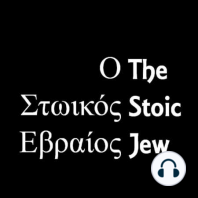6 min listen

Recap and Update on My Relation to Meditation (Epictetus – Enchiridion 20; Aurelius – Meditations 4:3; Seneca – Letter #2)
FromThe Stoic Jew
Recap and Update on My Relation to Meditation (Epictetus – Enchiridion 20; Aurelius – Meditations 4:3; Seneca – Letter #2)
FromThe Stoic Jew
ratings:
Length:
29 minutes
Released:
Mar 22, 2023
Format:
Podcast episode
Description
Length: 29 minutesSynopsis: I’ve recently been asked by several people about my current meditation practice and what I get out of it. I decided to make an episode in which I recap my history with meditation practices, review some of the key benefits of meditation according to Stoicism and Judaism, and conclude with a summary of my current relationship with meditation.Related Content: - On Doing Nothing: Part 1, Part 2, Part 3, and Part 4 - Q&A #06, Question #3 - Letting Go and Letting Be (my favorite Tara Brach meditation)Sources: - Dan Harris, 10% Happier: How I Tamed the Voice in My Head, Reduced Stress Without Losing My Edge, and Found Self-Help That Actually Works – a True Story - Epictetus, Enchiridion 20 - Aurelius, Meditations 4:3 - Rambam: Mishneh Torah, Sefer Ahavah, Hilchos Tefilah u’Birkas Kohanim 4:16 - Rambam: Commentary on the Mishnah, Berachos 5:1 - R’ Avraham ben ha’Rambam: Ha’Maspik l’Ovdei Hashem, Chapter 24: Obligations of Tefilah -----The Torah content for Rosh Chodesh Nisan has been sponsored by my friend and fellow Ralbag-enthusiast, Rabbi Dovid Campbell. Be sure to check out his website, NatureofTorah.com, and the article he published in the most recent edition of Hakirah entitled. Imitations and Semblances: How the Mitzvos Direct Our Exploration of Reality.-----If you have questions, comments, or feedback, I would love to hear from you! Please feel free to contact me at rabbischneeweiss at gmail.-----If you've gained from what you've learned here, please consider contributing to my Patreon at www.patreon.com/rabbischneeweiss. Alternatively, if you would like to make a direct contribution to the "Rabbi Schneeweiss Torah Content Fund," my Venmo is @Matt-Schneeweiss, and my Zelle and PayPal are mattschneeweiss at gmail.com. Even a small contribution goes a long way to covering the costs of my podcasts, and will provide me with the financial freedom to produce even more Torah content for you.If you would like to sponsor a day's or a week's worth of content, or if you are interested in enlisting my services as a teacher or tutor, you can reach me at rabbischneeweiss at gmail.com. Thank you to my listeners for listening, thank you to my readers for reading, and thank you to my supporters for supporting my efforts to make Torah ideas available and accessible to everyone.-----Substack: rabbischneeweiss.substack.com/Patreon: patreon.com/rabbischneeweissYouTube Channel: youtube.com/rabbischneeweissBlog: kolhaseridim.blogspot.com/"The Stoic Jew" Podcast: thestoicjew.buzzsprout.com"The Mishlei Podcast": mishlei.buzzsprout.com"Rambam Bekius" Podcast: rambambekius.buzzsprout.com"Machshavah Lab" Podcast: machshavahlab.buzzsprout.com"The Tefilah Podcast": tefilah.buzzsprout.comSupport the show
Released:
Mar 22, 2023
Format:
Podcast episode
Titles in the series (100)
Aurelius - Meditations 2:5 by The Stoic Jew